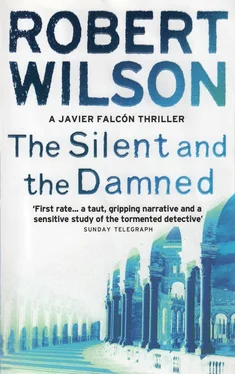'Is anything happening with the Montes inquiry?'
'We're still waiting for Elvira to give us another pair of hands.'
'Did the lawyer come back on the property he added to the list of assets in Montes's will?'
'Yes, I'm getting the Aracena town hall to check out if there was a building project on the property.'
'It's up in the sierra, is it?'
The phone rang. Ramírez picked it up, listened, said ' that Falcón was on his way and put it down.
'Alicia Aguado,' he said.
'I'd like you to check where exactly Ignacio Ortega ' was on the night that Rafael Vega was murdered.'
'I thought he was at the beach.'
'He didn't come into the frame until his brother died. I contacted him via his mobile. We've never checked him out properly.'
He drove to Calle Vidrio and sat at traffic lights with his hands pattering nervously on the steering wheel. A sense of doom stacked up inside him, while outside the relentless heat bore down on the straining city.
He played the tape of Salvador Ortega's interview to Alicia Aguado as they drove out to the prison. It took the whole journey. They sat in the car park listening to the end and some silence until the tape clicked off.
'I asked him if he'd testify against his father,' said Falcón. 'He refused.'
'People like Ignacio Ortega retain tremendous power over their victims, and the victims never lose their fear of the molester,' said Aguado as they got out of the car.
They walked up to the prison. She held his arm.
'I spoke to a friend of mine who works at the prison,' she said. 'He assesses disturbed prisoners, but he wasn't on Sebastián's case when he applied for solitary confinement, although he did hear about it. There was no sign of any disturbing behaviour. Sebastián was
Intelligent, friendly and completely benign – which I realize doesn't necessarily mean anything. But he did say something interesting. They all thought that Sebastián was not only happy to be where he was, he was also relieved.'
'To be away from the other inmates?'
'He couldn't say. He just said he was relieved,' she said. 'And, by the way, I'd like to talk to Sebastián alone. But if there's a room where you could observe from the outside, I'd be interested in you seeing the session.'
The director met them and arranged for the interview to be held in one of the 'safe' cells, where prisoners who were considered a possible danger to themselves were put for observation. There was CCTV and audio tape available. Two chairs were brought into the cell and placed side by side in opposite directions, to resemble the S-shaped chair in Alicia Aguado's consulting room. She sat facing the door. Sebastián was brought in and sat facing the wall. The door was shut, but it had a large reinforced observation panel. Falcón sat outside.
Alicia Aguado started off by explaining her method. Sebastián looked into the side of her face, valuing her words with the intensity of a lover. He bared his wrist to her and she laid her fingers on his pulse. He stroked her two fingernails with the tip of his finger.
'I'm glad you came back,' he said, 'but I'm not sure what you're doing here.'
'It's not unusual for prisoners who've suffered distressing news to be given a psychological assessment.'
'I didn't think I'd given them any cause to be concerned. I was upset, that's true. But now I'm calm.'
'It was a very strong reaction and you are a prisoner in solitary confinement. The authorities are concerned about the effects of distress, reactions to it and the possible reverberations in the prisoner's mind.'
'How did you go blind?' he asked. 'I don't think you've always been blind, have you?'
'No. I have a condition called retinitis pigmentosa.'
'I knew a girl at the Bellas Artes who had that,' he said. 'She was painting, painting, painting like mad… to get all the colours down before she went blind, because afterwards she'd have to stick to monochrome. I like that idea, cramming all the colour into the early years, before simplifying it in later life.'
'You're still interested in art?'
'Not to do it. I like to look at it.'
'I heard you were very good.'
'Who from?'
'Your uncle,' she said, and frowned, adjusted her fingers on his wrist.
'My uncle knows nothing about art. He has zero aesthetic sense. If he thought my work had been good, I would be worried. He's the sort of person who has concrete lions mounted on his gate posts. He hangs lurid tinted landscapes on his walls. He likes to spend his money on very expensive sound systems, but he has no taste in music. He thinks that Julio Iglesias should be sanctified and that Placido Domingo should learn some decent songs. He has an ear so finely tuned that it can perceive the slightest defect in his hifi speaker's output, but he can't hear a single note,' said Sebastián, who hadn't stopped looking at Alicia Aguado for a moment. 'I'd like to know your first name, Dra Aguado.'
'Alicia,' she said.
'What's it like being in the dark all the time, Alicia?' he said. 'I like being in the dark. I had a room where I could shut out all light and noise, and I used to lie on the bed with a sleeping mask on. It was velvet on the inside. It sat over my eyes, soft and warm as a cat. But what's it like having no choice, being in the dark but with no escape into the light? I think I should like It.'
'Why?' asked Alicia. 'It makes life very difficult.'
'No, no, Alicia, I disagree. It simplifies things. We are bombarded by too many images and ideas and words and thoughts and tastes and textures. Take away one of the major senses and think how much time that frees up. You can concentrate on sound. Touch will be so exciting because your fingers will never be bored by what the mind is telling them to expect. Taste will be an adventure. The only give-away is smell, the delicious smell of your food. I envy you, because you will rediscover life in all its richness.'
'How can you envy me that,' she said, 'after what you have done to yourself?'
'What have I done to myself?'
'You've closed yourself off from the world. You've decided that you want nothing of life in all its richness.'
'Are they really concerned for me after my father's death?' he asked.
'I'm worried about you.'
'Yes, you are. I can tell,' he said. 'And that's the thing, if I was blind I would know your beauty, and the ability to see you would only interfere with the purity of that.'
'You were very upset by your father's death and yet you ignored the letter he'd written to you.'
'It's not that unusual to hold two conflicting emotions in your mind at the same time. I loved him and I hated him.'
'Why did you love him?'
'Because he needed it. He had plenty of adoration, but almost no love. He was addicted to the adoration, which he mistook for love. When there was no adoration he felt unloved. So I loved him because he needed to be loved.'
'And why did you hate him?'
'Because he couldn't love me back. He hugged and kissed me, and then put me to one side, like a doll, to go and find what he thought was the real love. He did it because it was less complicated. That's why he had the dogs, Pavarotti and Callas: he liked that uncomplicated giving and receiving of love.'
'We talked to your cousin, Salvador.'
'Salvador,' he said. 'The saviour who cannot be saved.'
'Or the saviour who was unable to save?'
'I don't know what you mean by that.'
'Do you ever think about your mother?'
'Every day.'
'And what do you think about her?'
'I think about how she was misunderstood.'
'But you don't think of maternal love?'
'I do think of that, yes, but in remembering it I always find that the next thought was how she was misunderstood. It sticks in a son's mind to hear his mother referred to as a whore. She wasn't a whore. She loved my father and admired him. He never reciprocated. He went off to claim his fame in Spain and around the world. And she found other people to love.'
Читать дальше
Конец ознакомительного отрывка
Купить книгу












